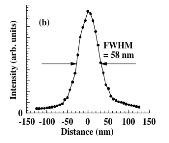FZP を用いたマイクロビーム
Inquiry number
SOL-0000001456
Beamline
BL20XU (Medical and Imaging II)
Scientific keywords
| A. Sample category | research on method, instrumentation |
|---|---|
| B. Sample category (detail) | metal, alloy |
| C. Technique | X-ray diffraction, absorption and its secondary process, fluorescent X-rays |
| D. Technique (detail) | interference, reflection, refraction, trace-element |
| E. Particular condition | microbeam (sub-µm), 2D imaging, X-ray microscopy |
| F. Photon energy | X-ray (4-40 keV) |
| G. Target information | morphology, elemental composition |
Industrial keywords
| level 1---Application area | Semiconductor |
|---|---|
| level 2---Target | silicon semiconductor |
| level 3---Target (detail) | wire |
| level 4---Obtainable information | molphology |
| level 5---Technique | imaging |
Classification
A80.10 electronics
Body text
X線マイクロビームを用いた走査型顕微鏡は、試料の二次元的な構造(例えば、組成や微量元素分布)を測定できる手法です。ここでは、そのX線マイクロビーム生成のための集光光学素子の性能を測定した例を示します。この集光光学素子は半導体微細加工に使われている電子線リソグラフィーの技術で作成されたフレネルゾーンプレート(FZP)です。測定したFZPは最外線幅50nmのものですが、図に示すように理論分解能にほぼ等しい集光ビームサイズが得られていることがこの実験から分かりました。
ナイフエッジスキャン法で測定した集光ビームプロファイル
X線エネルギー:8keV
[ Y. Suzuki, A. Takeuchi, H. Takano and H. Takenaka, Japanese Journal of Applied Physics 44, 1994-1998 (2005), Fig. 5,
©2005 日本応用物理学会 ]
Source of the figure
Original paper/Journal article
Journal title
Jpn. J. Appl. Phys. 44 (2005) 1994-1998.
Figure No.
5
Technique
平行性の高いX線ビームを集光光学素子に照射して得られた集光ビームプロファイルをナイフエッジテストで測定する方法はその光学素子の限界分解能を実測する普遍的な手法です。BL20XUはアンジュレータ光源であり、かつ他の一般のビームラインよりはるかに長いビームライン長を有しています。この248mのビームライン長を利用することで空間コヒーレンスの高いX線ビームが得られます。この特長を利用することで集光光学素子の限界性能を調べることが出来ました。
Source of the figure
No figure
Required time for experimental setup
3 shift(s)
Instruments
| Instrument | Purpose | Performance |
|---|---|---|
| 多目的イメージング用精密回折計 | マイクロビーム生成 | |
| ビームモニタ2型 | 光学系の調整 | 画素サイズ4.3ミクロン |
References
Related experimental techniques
Questionnaire
The measurement was possible only in SPring-8. Impossible or very difficult in other facilities.
This solution is an application of a main instrument of the beamline.
Ease of measurement
Middle
Ease of analysis
Easy
How many shifts were needed for taking whole data in the figure?
Two-three shifts


